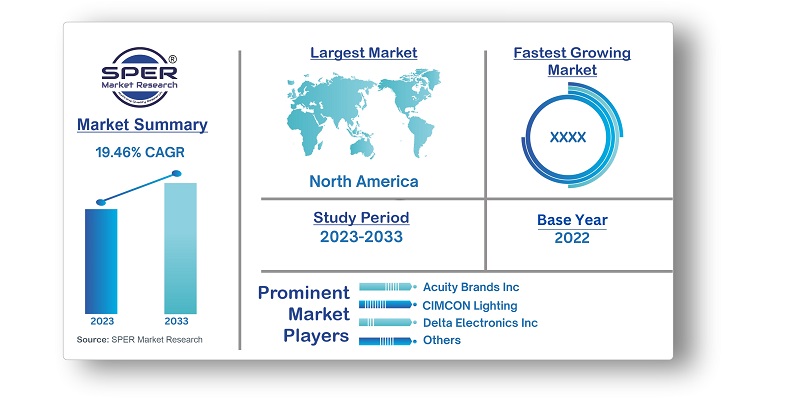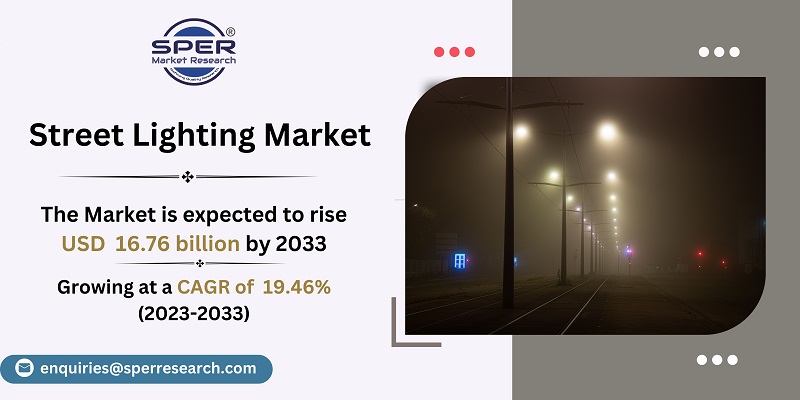
Smart Street Lighting Market Growth, Size, Trends, Demand, Revenue, Share and Future Outlook
Smart Street Lighting Market Size- By Component, By Type, By Application- Regional Outlook, Competitive Strategies and Segment Forecast to 2033
| Published: Dec-2023 | Report ID: IACT23208 | Pages: 1 - 230 | Formats*: |
| Category : Information & Communications Technology | |||
- SAP SE has acquired Signavio GmbH, a provider of process management and business process intelligence. The integration of SAP's business process intelligence unit with Signavio will aid in the transformation and improvement of the organization's business processes at scale.
- GE Current acquired Hubbell Incorporated's Commercial & Industrial (C&I) lighting business, creating an overall lighting solutions business known as Current. The combined company now provides a diverse portfolio of fixtures and controls, lamps, roadway, signage, transportation, and horticulture markets.


| Report Metric | Details |
| Market size available for years | 2019-2033 |
| Base year considered | 2022 |
| Forecast period | 2023-2033 |
| Segments covered | By Component, By Type, By Application |
| Regions covered | North America, Asia-Pacific, Latin America, Middle East & Africa and Europe |
| Companies Covered | Acuity Brands Inc., CIMCON Lighting, Delta Electronics Inc, Echelon Corporation, GridComm, Guangdong Rongwen Energy Technology Group, InteliLIGHT (Flashnet SA), Itron Inc., Sensus (a Xylem Brand), Signify Holding, Telensa Limited, TVILIGHT Projects BV, Others |
- City Planners and Municipal Authorities
- Government Agencies and Regulatory Bodies
- Urban Development and Infrastructure Companies
- Technology Providers and Suppliers
- Energy Management and Utility Companies
| By Component: |
|
| By Type: |
|
| By Application: |
|
- Global Smart Street Lighting Market Size (FY’2023-FY’2033)
- Overview of Global Smart Street Lighting Market
- Segmentation of Global Smart Street Lighting Market By Component (Hardware, Software, Services)
- Segmentation of Global Smart Street Lighting Market By Type (Narrowband, Broadband)
- Segmentation of Global Smart Street Lighting Market By Application (Smart Parking, Street Light Management)
- Statistical Snap of Global Smart Street Lighting Market
- Expansion Analysis of Global Smart Street Lighting Market
- Problems and Obstacles in Global Smart Street Lighting Market
- Competitive Landscape in the Global Smart Street Lighting Market
- Impact of COVID-19 and Demonetization on Global Smart Street Lighting Market
- Details on Current Investment in Global Smart Street Lighting Market
- Competitive Analysis of Global Smart Street Lighting Market
- Prominent Players in the Global Smart Street Lighting Market
- SWOT Analysis of Global Smart Street Lighting Market
- Global Smart Street Lighting Market Future Outlook and Projections (FY’2023-FY’2033)
- Recommendations from Analyst
1.1. Scope of the report1.2. Market segment analysis
2.1. Research data source
2.1.1. Secondary Data2.1.2. Primary Data2.1.3. SPER’s internal database2.1.4. Premium insight from KOL’s
2.2. Market size estimation
2.2.1. Top-down and Bottom-up approach
2.3. Data triangulation
4.1. Driver, Restraint, Opportunity and Challenges analysis
4.1.1. Drivers4.1.2. Restraints4.1.3. Opportunities4.1.4. Challenges
4.2. COVID-19 Impacts of the Global Smart Street Lighting Market
5.1. SWOT Analysis
5.1.1. Strengths5.1.2. Weaknesses5.1.3. Opportunities5.1.4. Threats
5.2. PESTEL Analysis
5.2.1. Political Landscape5.2.2. Economic Landscape5.2.3. Social Landscape5.2.4. Technological Landscape5.2.5. Environmental Landscape5.2.6. Legal Landscape
5.3. PORTER’s Five Forces
5.3.1. Bargaining power of suppliers5.3.2. Bargaining power of buyers5.3.3. Threat of Substitute5.3.4. Threat of new entrant5.3.5. Competitive rivalry
5.4. Heat Map Analysis
6.1. Global Smart Street Lighting Market Manufacturing Base Distribution, Sales Area, Product Type6.2. Mergers & Acquisitions, Partnerships, Product Launch, and Collaboration in Global Smart Street Lighting Market
7.1. Global Smart Street Lighting Market Value Share and Forecast, By Component, 2023-20337.2. Hardware7.3. Software7.4. Services
8.1. Global Smart Street Lighting Market Value Share and Forecast, By Type, 2023-20338.2. Narrowband8.3. Broadband
9.1. Global Smart Street Lighting Market Value Share and Forecast, By Application, 2023-20339.2. Smart Parking9.3. Street Light Management
10.1. Global Smart Street Lighting Market Size and Market Share
11.1. Global Smart Street Lighting Market Size and Market Share By Component (2019-2026)11.2. Global Smart Street Lighting Market Size and Market Share By Component (2027-2033)
12.1. Global Smart Street Lighting Market Size and Market Share By Type (2019-2026)12.2. Global Smart Street Lighting Market Size and Market Share By Type (2027-2033)
13.1. Global Smart Street Lighting Market Size and Market Share By Application (2019-2026)13.2. Global Smart Street Lighting Market Size and Market Share By Application (2027-2033)
14.1. Global Smart Street Lighting Market Size and Market Share By Region (2019-2026)14.2. Global Smart Street Lighting Market Size and Market Share By Region (2027-2033)14.3. Asia-Pacific
14.3.1. Australia14.3.2. China14.3.3. India14.3.4. Japan14.3.5. South Korea14.3.6. Rest of Asia-Pacific
14.4. Europe
14.4.1. France14.4.2. Germany14.4.3. Italy14.4.4. Spain14.4.5. United Kingdom14.4.6. Rest of Europe
14.5. Middle East and Africa
14.5.1. Kingdom of Saudi Arabia14.5.2. United Arab Emirates14.5.3. Rest of Middle East & Africa
14.6. North America
14.6.1. Canada14.6.2. Mexico14.6.3. United States
14.7. Latin America
14.7.1. Argentina14.7.2. Brazil
14.7.3. Rest of Latin America
15.1. Acuity Brands Inc.
15.1.1. Company details15.1.2. Financial outlook15.1.3. Product summary15.1.4. Recent developments
15.2. CIMCON Lighting
15.2.1. Company details15.2.2. Financial outlook15.2.3. Product summary15.2.4. Recent developments
15.3. Delta Electronics Inc
15.3.1. Company details15.3.2. Financial outlook15.3.3. Product summary15.3.4. Recent developments
15.4. Echelon Corporation
15.4.1. Company details15.4.2. Financial outlook15.4.3. Product summary15.4.4. Recent developments
15.5. GridComm
15.5.1. Company details15.5.2. Financial outlook15.5.3. Product summary15.5.4. Recent developments
15.6. Guangdong Rongwen Energy Technology Group
15.6.1. Company details15.6.2. Financial outlook15.6.3. Product summary15.6.4. Recent developments
15.7. InteliLIGHT (Flashnet SA)
15.7.1. Company details15.7.2. Financial outlook15.7.3. Product summary15.7.4. Recent developments
15.8. Itron Inc.
15.8.1. Company details15.8.2. Financial outlook15.8.3. Product summary15.8.4. Recent developments
15.9. Sensus, a Xylem Brand
15.9.1. Company details15.9.2. Financial outlook15.9.3. Product summary15.9.4. Recent developments
15.10. Signify Holding
15.10.1. Company details15.10.2. Financial outlook15.10.3. Product summary15.10.4. Recent developments
15.11. Telensa Limited
15.11.1. Company details15.11.2. Financial outlook15.11.3. Product summary15.11.4. Recent developments
15.12. TVILIGHT Projects BV
15.12.1. Company details15.12.2. Financial outlook15.12.3. Product summary
15.13. Others
SPER Market Research’s methodology uses great emphasis on primary research to ensure that the market intelligence insights are up to date, reliable and accurate. Primary interviews are done with players involved in each phase of a supply chain to analyze the market forecasting. The secondary research method is used to help you fully understand how the future markets and the spending patterns look likes.
The report is based on in-depth qualitative and quantitative analysis of the Product Market. The quantitative analysis involves the application of various projection and sampling techniques. The qualitative analysis involves primary interviews, surveys, and vendor briefings. The data gathered as a result of these processes are validated through experts opinion. Our research methodology entails an ideal mixture of primary and secondary initiatives.



Frequently Asked Questions About This Report
PLACE AN ORDER
Year End Discount
Sample Report
Pre-Purchase Inquiry
NEED CUSTOMIZATION?
Request CustomizationCALL OR EMAIL US
100% Secure Payment






Related Reports
Our Global Clients
Our data-driven insights have influenced the strategy of 200+ reputed companies across the globe.




















